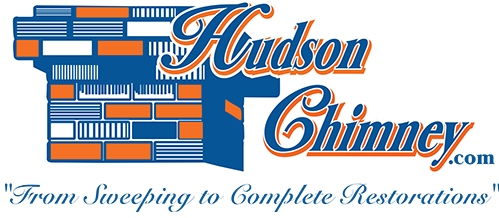by Mark Hudson | Jun 4, 2015 | Storm Damage
Since we call Northeastern Florida our home, Hudson Chimney is familiar with the heavy rains that come with summer storms, and we are very experienced with the damage these rainstorms can do to chimneys. Repairing leaky chimneys and preventing further water penetration of masonry chimneys are two jobs you can trust our certified chimney technicians with performing. We would like to tell you more about the damage water leaks can do to your chimney and your home as well as the preventive measures we can take to protect your masonry chimney from the heavy rains of the summer storms we frequently see in our area.
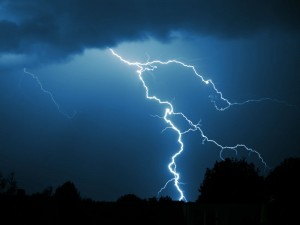
THE DAMAGE DONE BY WATER PENETRATION
According to the Chimney Safety Institute of America (CSIA), water is your masonry chimney’s biggest enemy. Since chimneys are built using materials like brick, mortar, concrete, stone, flue tile, steel, and cast-iron, they are seriously compromised by water leaks because every one of these building materials are negatively affected by direct contact with water. What kind of damage can water penetration do to your masonry chimney system and home? Examples of the expensive and possibly dangerous damage from water leaks include the following:
- rusted fireplace and chimney parts
- rotted wood that surrounds your fireplace
- stains on the walls and ceilings around your fireplace
- deteriorated exterior chimney
- cracked or damaged flue liner
- collapsed hearth support
- leaning or collapsed chimney structure
THE PREVENTION OF WATER LEAKS
The certified chimney technicians at Hudson Chimney offer a couple of ways to protect your masonry chimney from water penetration and remove the possibilities of water leaks, including:
Waterproofing
Using a 100% vapor permeable formula that allows your chimney to still be able to “breathe,” our chimney technicians will apply this formula to let water that has already penetrated your masonry chimney escape, which will prevent future damage such as spalling and erosion due to the freeze-thaw process. Furthermore, the waterproofing formula keeps water from entering from the outside to protect your masonry chimney from water leaks and other deterioration. You can trust Hudson Chimney to never use paint or clear sealers as these may cause even more spalling damage by trapping water vapors and moisture inside your chimney.
Flashing
A poorly done flashing job can actually cause water to penetrate your chimney because water from rain and melted snow can enter through gaps in the flashing. Our technicians will customize the flashing to properly fit around your exterior chimney where it meets the roof. We will work with a licensed roofer to guarantee the flashing has been done correctly.
Be prepared for the heavy rains from the upcoming summer storms. Contact Hudson Chimney to prevent water penetration damage of your masonry chimney.
by Mark Hudson | May 28, 2015 | Jacksonville
In 1979, Mark Hudson founded Hudson Chimney to provide professional fireplace and chimney services in Northeastern Florida. Certified by the Chimney Safety Institute of America (CSIA) as a chimney sweep and a dryer vent technician, Hudson is proud to serve the city of Jacksonville and works hard on community projects to make Jacksonville an even better place. We would like to tell you more about this beautiful city we have served for over 30 years.
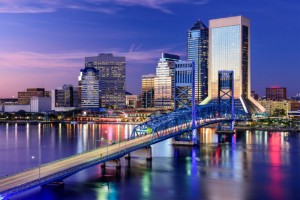
WATER ACTIVITIES
With over 22 miles of beaches, Jacksonville is home to three beaches: Atlantic Beach, Jacksonville Beach, and Neptune Beach. Our beach areas offer dining, entertainment, lodging, and recreational activities for the entire family. Fishermen have the best of both worlds in Jacksonville with freshwater and saltwater fishing opportunities. You can even deep sea fish in the Atlantic Ocean. The St. Johns River flows through the city and provides a place to kayak and paddleboard.
ARTS AND CULTURE
Named as one of the top 25 destinations for the arts in this country, Jacksonville is home to several museum, including the Museum of Contemporary Art Jacksonville (MOCA). At MOCA, you will find over one thousand works of art, such as painting, photography, sculpture, and printmaking. You can also find live theater and live music throughout the city as well as festivals throughout the year that celebrate jazz, blues, and country music.
SPORTS
Sports fans have a lot to enjoy in Jacksonville. You can watch professional football by going to see a Jacksonville Jaguars game, and you can catch one of the biggest professional golf tournaments, THE PLAYERS Championship. Golfers can even play a round at the site of this tournament. Outdoor sports enthusiasts can enjoy biking, hiking, canoeing, surfing, and other activities along our scenic waterways.
HISTORY
Filled with multiculturalism, the history of Jacksonville can be found throughout the city. One of the city’s most important historical sites is Fort Mose, which was both the earliest legal settlements in America for free Africans and the precursor site to the Underground Railroad. For a deeper look at the history of Jacksonville, tour one of our historical museums, such as the Mandarin Museum & Historical Society that shows what life was like in 19th century Florida.
SHOPPING
Whether you prefer shopping at a mall, at locally-owned boutiques, along the beachside, or in a downtown setting, Jacksonville is filled with opportunities to shop until you drop. If you like to save money, you will enjoy shopping at our two outlet shopping centers. No matter your budget, shopping enthusiasts will love what our city has to offer.
Want to know more about Jacksonville? Contact Hudson Chimney to find out our favorite places and things to do in this beautiful city.
by Mark Hudson | May 8, 2015 | Chimney Leaks
Do you have a masonry chimney? If you do, you may already know that the likelihood of having a leaky chimney can be quite high. Why are masonry chimneys so likely to experience water leaks? The Chimney Safety Institute of America (CSIA) answers this question by stating that water is the biggest enemy of a masonry chimney. Every component of your chimney can possibly suffer expensive and extensive damage when water penetrates into your chimney. Stained ceilings or walls, loose bricks and chipped mortar on the exterior of your chimney, and musty or moldy odors coming from your fireplace are all signs of a leaky chimney. If you have seen any of these signs, it is crucial to contact a professional chimney company like Hudson Chimney to locate the source of the leak and make repairs so that your fireplace and chimney system can function safely and properly. But, what exactly can lead to a leaky chimney? We would like to tell you four problems that allow water to easily penetrate your chimney.

1. DAMAGED OR MISSING CHIMNEY CAPS
Chimney caps are your least expensive preventive measures against water penetration because they cover the top of your chimney. Freezing temperatures and destructive animals trying to get into your chimney can cause cracks and other damage your chimney cap. When your chimney cap is damaged (or even worse, missing completely), water from rain and melted snow can easily get into the masonry work of the interior of your chimney. Hudson Chimney offers a wide variety of chimney caps, and our certified technicians can install a custom-fitted cap to protect your chimney from water leaks.
2. DETERIORATED CHIMNEY CROWNS
Located directly beneath the chimney cap, a chimney crown is constructed from concrete and used to seal the opening of your chimney. Unfortunately, your crown could be made from the wrong or ineffective material, or it could be improperly installed. In these situations, damage and deterioration will occur sooner than later, and you will have an opening to your chimney where water can easily enter. The masons at Hudson Chimney can repair damaged chimney crowns as well as correctly install custom-made crowns to keep the water out of your chimney.
3. DAMAGED FLASHING
Flashing is sheeting made from metal that is placed between your chimney and your roof to protect this area from water leaks. Easily improperly installed, not every chimney company will the time to customize the flashing itself for a perfect fit. Our technicians will customize flashing by carefully measuring each part of your chimney and its surrounding areas on your roof so that it fits exactly and leaves no holes or cracks, which allow water penetration of your chimney.
4. WORN OUT MORTAR JOINTS
Water deteriorates the essential mortar joints that hold your chimney together and creates holes and cracks within the masonry. In the winter, water trapped in your chimney freezes and thaws, which leads to the bricks breaking and crumbling, and this will cause even more water leak problems. Fortunately, Hudson Chimney can do masonry repairs using the tuck pointing process. Once we have completed these repairs, we can apply a waterproofing treatment that will ensure that your masonry work in your chimney is protected from any water leaks in the future.
Dealing with a leaky chimney? Contact Hudson Chimney to schedule a visit from one of our certified masons to fix your water penetration problems.
by Mark Hudson | Apr 29, 2015 | Chimney Swifts
If you have ever heard chattering, fluttering, and other noises coming from your chimney as the weather gets warmer, there is a good possibility that chimney swifts have taken over your chimney as their new home. These migratory birds are named for their habit of nesting in chimneys. Once a family of chimney swifts has nested in your chimney, it is illegal to remove them. Some of our customers choose to share their chimneys with these birds every year. However, Hudson Chimney is often asked how to prevent chimney swifts from setting up their summer homes in their chimneys, and we recommend installing a chimney cap with mesh siding to keep these birds from ever entering your chimney. We would like to tell you more about chimney swifts and what you can do about them nesting in your chimney.
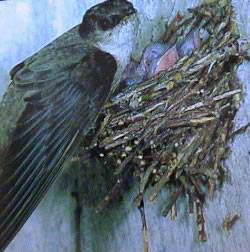
What exactly are chimney swifts?
According to the Driftwood Wildlife Association’s project to promote the conservation of chimney swifts, they are fascinating, adaptable birds who learned to nest and roost in chimneys when their native habitat of large hollow trees in forests of North America were cut down. The birds make their return from South America after their wintering is over, and as they are migratory, they tend to return to the same nesting area. However, if a family of chimney swifts does nest in your chimney, you should be aware that these birds are protected by the Migratory Bird Treaty Act, and removing or destroying nests with eggs or young can result in fines and penalties.
What should I do if I would like to share my chimney with chimney swifts?
On the Driftwood Wildlife Association’s website, the article “Being a Good Chimney Swift Landlord” offers invaluable tips for those who do not mind sharing their chimney with these birds. Because they do only nest during the summer season, this article recommends having your chimney swept in mid-March to have all of the creosote build-up removed. An abundance of creosote deposits makes it impossible for the chimney swifts to build their nests to the walls without danger of falling. This article also stresses the importance of chimney swifts being protected by federal law and warns against chimney sweep businesses who illegally remove chimney swift nests and eggs. Be wary of companies who advertise “bird removal,” as this is a blatant violation of state and federal laws that protect migratory birds. Instead, choose a trusted company like Hudson Chimney to perform your annual chimney sweep. Even though the noises of the baby birds chirping for food can be shrill and annoying, they will not last forever. Remember that this is only temporary, and after this short period, you will practically not even realize the chimney shifts are there. However, be sure your damper is completely closed to keep them from flying into your house.
What should I do after the chimney swifts leave in the fall?
The nests of these birds are small, cup-shaped constructions of small twigs glued to chimney walls by the saliva of the chimney swifts. Too small to be a fire hazard, you will still need to contact Hudson Chimney to remove the nest after they leave in the fall. This is needed to remove bird parasites. Additionally, as chimney swifts tend to return to the same nesting spot, you do not want them to try to use the old nest as it will be unstable and probably collapse.
What if I want to prevent these birds from nesting in my chimney?
A good quality chimney cap that is equipped with mesh screening is the best prevention against chimney swifts moving into your chimney. Hudson Chimney sells and installs a variety of different caps, and we can advise you on the best time to install your new chimney cap.
Want to know more information about chimney swifts? Contact Hudson Chimney to learn more about these birds as well as about chimney cap installation.
by Mark Hudson | Feb 6, 2015 | Chimney Service
Believe it or not, spring is on its way, and fireplace season will be slowing down. To be sure your chimney is safe after a long and cold winter, scheduling your annual chimney sweeping and inspection now is essential, especially if your chimney is in need of important repairs. At Hudson Chimney, one of our busiest times of the year is the spring, and if you procrastinate for too long, you may have to wait for several weeks before you can arrange an appointment for our certified technicians to visit your home to clean, examine, and repair your chimney. According to fire safety organizations such as the National Fire Prevention Association (NFPA), it is recommended you schedule a chimney sweeping and inspection once every year. We would like to share with you the important chimney maintenance steps our chimney technicians will take to find essential repairs needed to make your fireplace and chimney system safe.
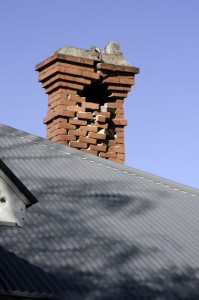
CHIMNEY SWEEPING
When the Chimney Safety Institute of America (CSIA)-certified sweeps at Hudson Chimney clean your chimney after winter, our main concern is removing all of the creosote deposits that have accumulated on the walls of your chimney. Forming naturally as the by-products of combustion (smoke, gases, tar fog, vapors, etc) exit the cooler walls of your upper chimney, creosote is the highly combustible result of the condensation that occurs. Creosote can be either black or brown, and its appearance can vary. Whether it is sticky and gummy, crispy and brittle, or shiny and hard, creosote, especially in large amounts, is extremely flammable, which makes it the cause of a majority of chimney fires. Getting rid of these creosote buildups after winter’s heavy fireplace usage is essential to the safety of your chimney.
CHIMNEY INSPECTING
Hudson Chimney takes pride in performing detailed post-winter chimney inspections because we want to find any damage that needs repairing to ensure the safety of your fireplace and chimney. Of course, we seriously examine every part of your chimney; however, there are specific repairs we are looking for, including the following:
damaged or deteriorated masonry — Loose bricks and chipped mortar on the exterior of your chimney are sure signs of water penetration damage, and this alerts us to the possibility of water leaking inside your chimney that creates even more damage to its interior. If this masonry damage goes unrepaired, you will end up with costly repair work, including a possible rebuild of your entire chimney.
cracks in the chimney cap — Your chimney cap serves as protection from both water and animal intrusions of your chimney. A deteriorated chimney cap serves no help at all to your chimney. We can repair cracks and other damage to chimney caps as well as install new caps if the existing caps are beyond repairing.
cracks and holes in the chimney flue liner — Water leaks can cause serious damage to the liner of your chimney that can endanger your family’s health. A deteriorating flue liner allows toxic gases like carbon monoxide to leak into your home. Repairing or replacing a damaged chimney flue liner will keep those gases exiting out of your chimney instead of infiltrating the interior air of your home.
Save yourself the hassle of waiting for weeks to maintain your chimney after winter by contacting Hudson Chimney now. We are happy to schedule an appointment for your annual sweeping and inspection as well as perform all necessary repairs.
